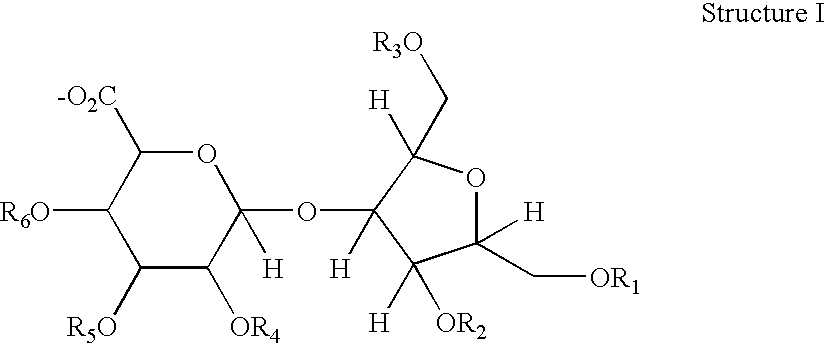Hypersulfated disaccharides and methods of using the same for the treatment of inflammations
a technology of hypersulfated disaccharides and inflammatory diseases, applied in the direction of aerosol delivery, immunological disorders, drug compositions, etc., can solve the problems of increasing the hyperresponsiveness of the airway to allergens, poor asthma control, and increasing asthma. , to achieve the effect of reducing inflammatory responses, reducing inflammatory responses, and reducing inflammatory responses
- Summary
- Abstract
- Description
- Claims
- Application Information
AI Technical Summary
Benefits of technology
Problems solved by technology
Method used
Image
Examples
example i
Depolymerization of Heparin Sodium
[0110] To illustrate the preparation of sulfated disaccharides fractions to be used as control samples as well as to be used as starting materials for the preparation of representative hypersulfated compounds (see Examples II and III, infra) according to the invention the following protocols were used. The following procedures describes one of the many possible ways utilized for the partial degradation of heparin sodium. At room temperature, 250 g of commerically available (porcine) heparin-Na (obtained from SPL, Waunakee, Wis.) were added to a beaker containing 3 liters of H.sub.2O and stirred to a slurry, at which point 2 liters of H.sub.2O were added and stirring was resumed to completely dissolve the heparin sodium.
[0111] The pH in the heparin solution was then adjusted to 5.98. To this solution 17.25 g of NaNO.sub.2 were added (0.25 mmol, J. T. Baker, ACS grade) to accomplish the controlled nitrous acid depolymerization of the heparin. Stirring...
example ii
Ultrafiltration of Depolymerized Heparin Preparation
[0113] The following protocol iustmates one of the possible ways to coulect permeate (03000 Da) representative disaccharides according to the invention. Alternative methodologies are well Imown in the art and may be substituted. The depolymerized heparin solution obtained as descnbed in Example I was diluted to a final volume of 8 liters with dtH.sub.2O and filtered (Millipore (Bedford, Mass.)), Pellicon 2, 3k PLBC-C having an area of 0.5m2 (Cassette: Cat # P2 PLBCC 05), (molecular weight cut off of 3 kDa) to collect and enrich for heparin oligosaccharides of less than 3 kDa (3000 daltons) in size (ie, the permeate consisted of those oligonucleotides of less than 3000 daltons).
2 TIME T .degree. C. P.sub.in P.sub.out SETT. FLOW RATE VOL. DF 2:58 p.m. 26 60 52 46 862 ml / min. 0 0 3:33 p.m. 32 60 52 46 960 ml / min. 36 L 4.75 4:02 p.m. 33 60 52 46 975 ml / min. 65 L 8.12
[0114] The retentate (ie, the nitrous acid treated heparin that was la...
example iii
Reduction of the Oligosaccharide Preparation with NaBH.sub.4
[0115] The freeze-dried oligosaccharide preparation (50 g) dissolved in 1L purified H.sub.2O was cooled to 2-10.degree. C. with an ice bath NaHCO.sub.3 (21 g) was added to the cooled oligosaccharide solution and the preparation stirred until completely dissolved. A 0.5 M solution of NaBH in 400mL of 0.01M NaOH solution was prepared and slovay added to the cooled oligosaccharide / NaHCO.sub.3 solution over a 60 minute period. The treatment of 0.5 M solution of NaBH.sub.4 was to reduce the oligomix-CHO to Oligomix-CH2OH. The reaction preparation was stirred at 2-10.degree. C. for 3 hours, then quenched with concentrated HC; to pH 4.0. The pH of the solution was then adjusted to 6.75 with NaOH and finally concetrated to a minimal volume by Reverse Osmosis and later freeze-dried to afford the reduced oligosaccharides. The reduced oligosacchardie preparation of less than 3 kDa in size were later subjected to fractionization by Siz...
PUM
| Property | Measurement | Unit |
|---|---|---|
| molecular weight | aaaaa | aaaaa |
| molecular weight | aaaaa | aaaaa |
| molecular weight | aaaaa | aaaaa |
Abstract
Description
Claims
Application Information
 Login to View More
Login to View More - R&D
- Intellectual Property
- Life Sciences
- Materials
- Tech Scout
- Unparalleled Data Quality
- Higher Quality Content
- 60% Fewer Hallucinations
Browse by: Latest US Patents, China's latest patents, Technical Efficacy Thesaurus, Application Domain, Technology Topic, Popular Technical Reports.
© 2025 PatSnap. All rights reserved.Legal|Privacy policy|Modern Slavery Act Transparency Statement|Sitemap|About US| Contact US: help@patsnap.com



